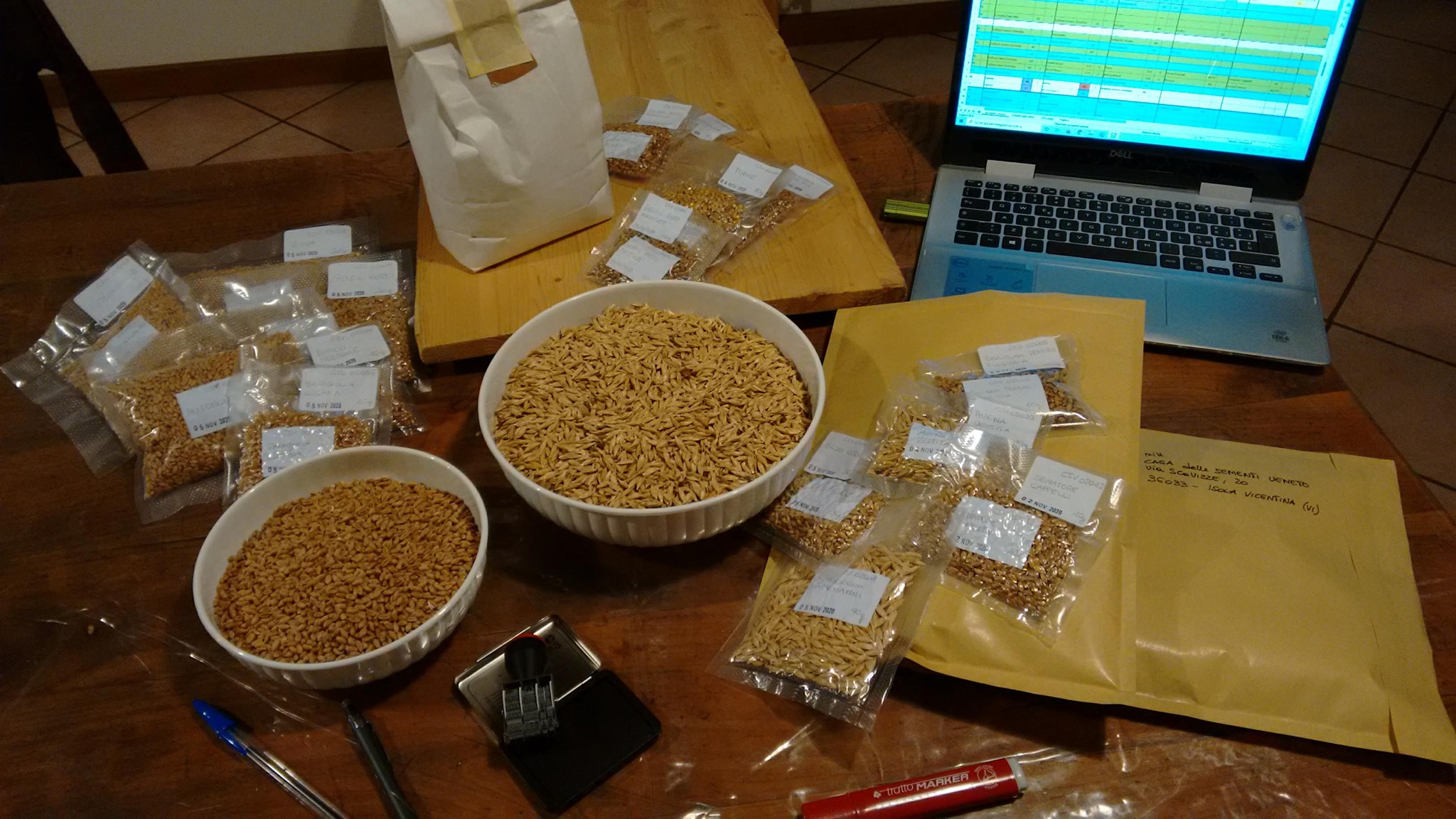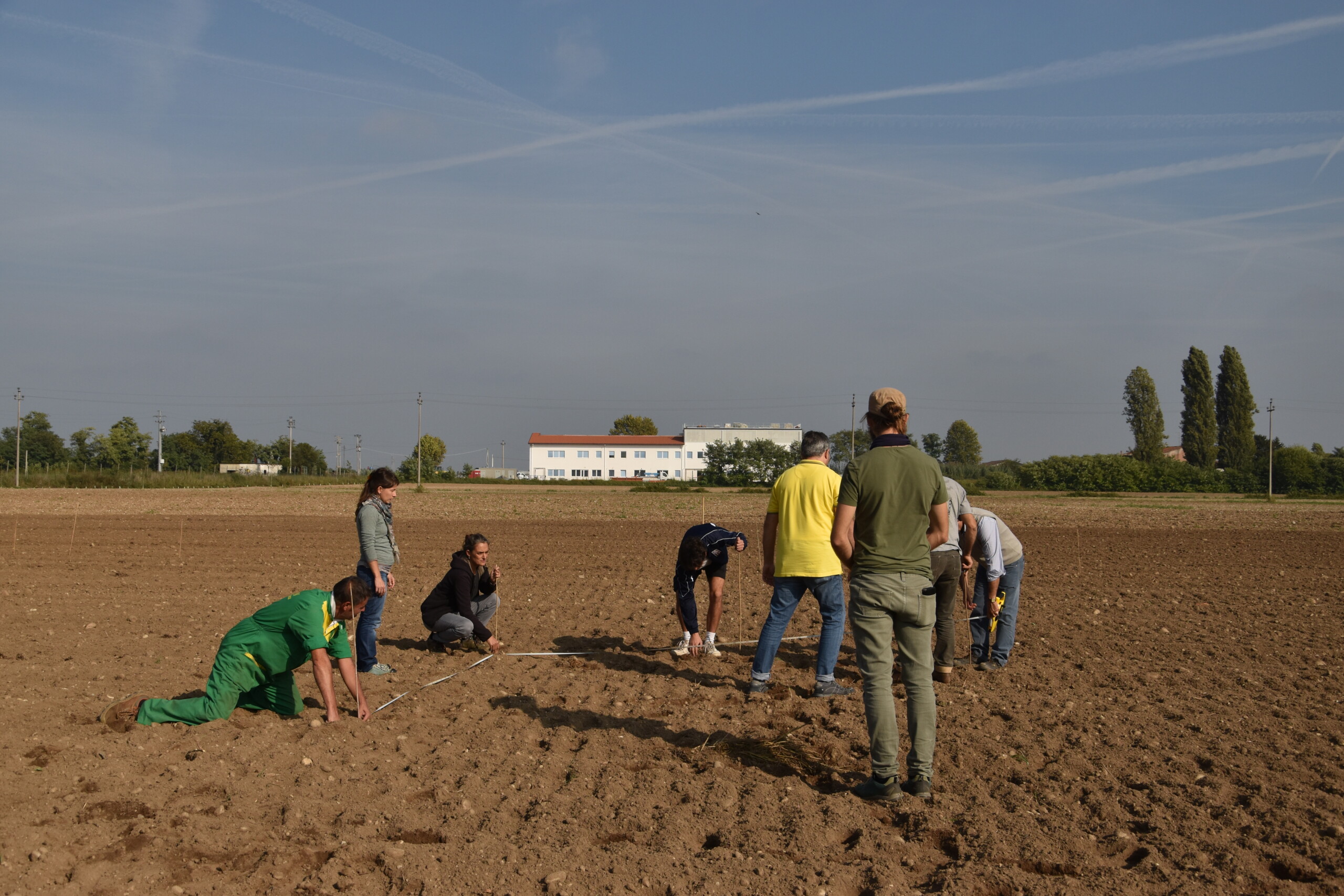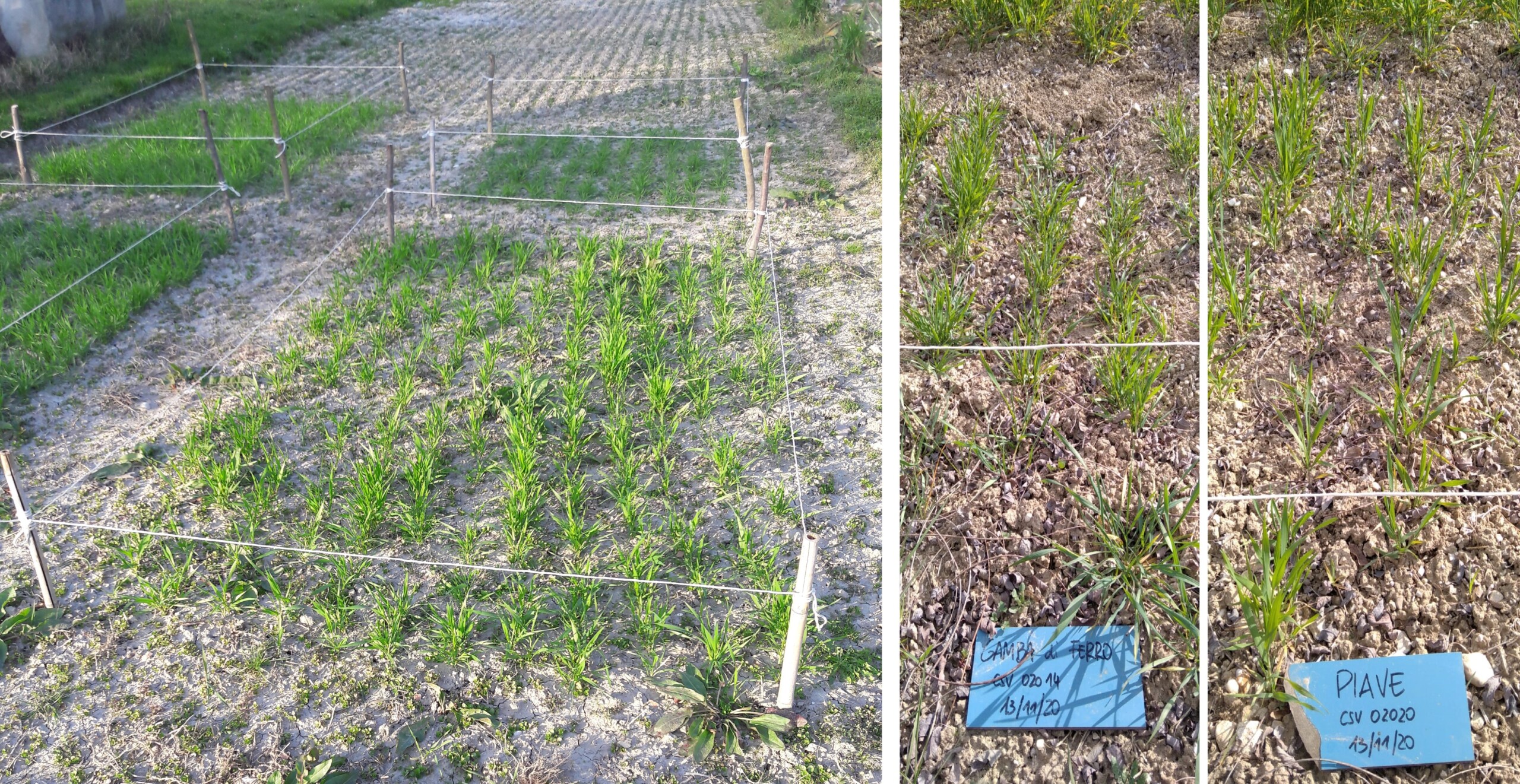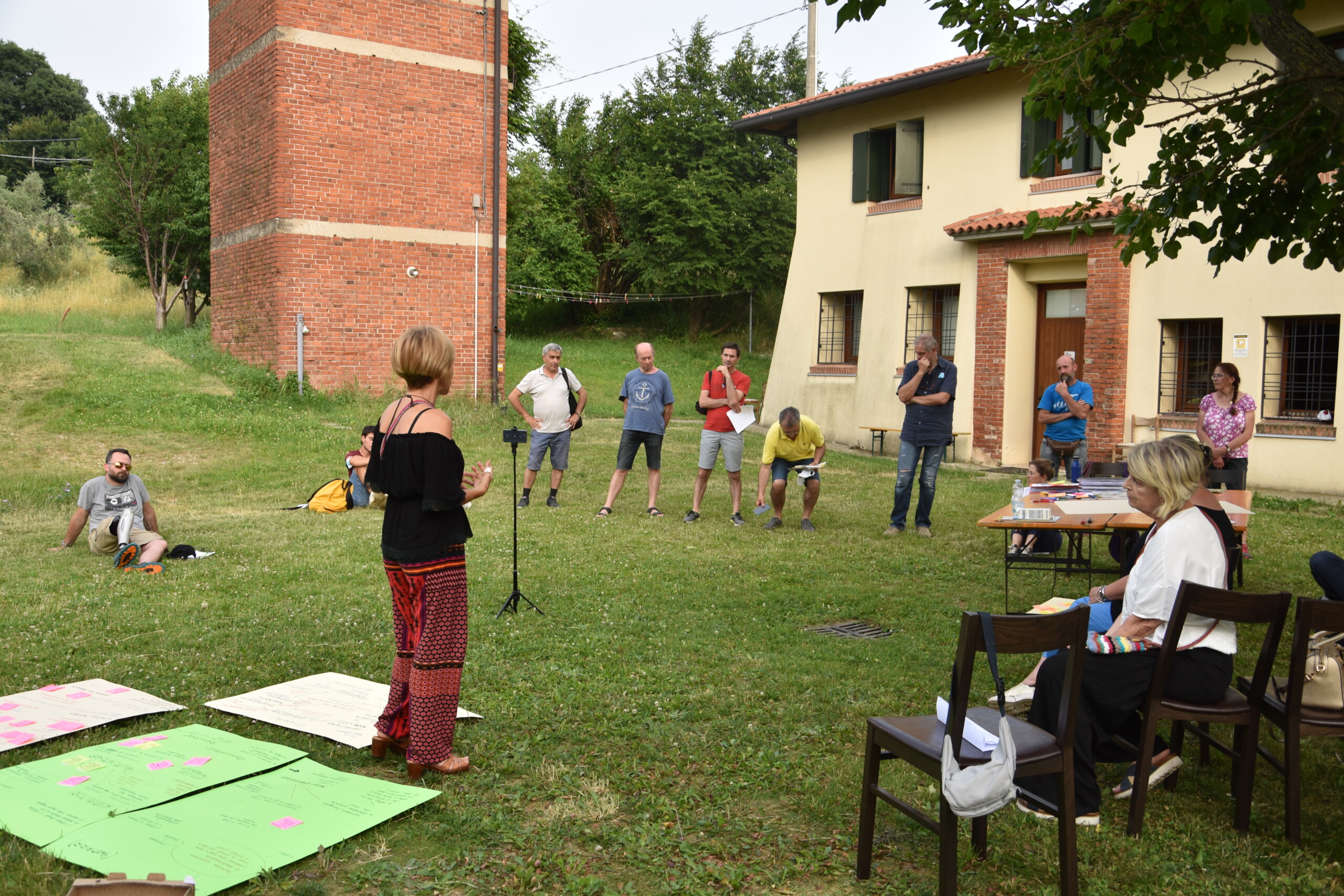CONSEMI – A community seed bank for local and heritage varieties and evolutionary populations in Veneto
What was the challenge/ problem that was addressed?
Lack of suitable varieties for low-input farming; loss of agricultural biodiversity and related dispersion of know-how at farming, processing, and culinary levels; input dependency on corporate breeders and dealers; climatic and parasitic vagaries becoming harder to cope with; inadequate support from public research and advisors. These aspects emerged in the course of the lively exchanges held during the ‘Grafis’ setting up phase (6 workshops, 2 farm open days, and a public event; altogether 283 actors were involved) that led to the ‘Consemi’ Operational Group.
More specifically, the main challenge was identified in the inventory, collection, and accessibility of local and heritage genetic material of cereals with specific adaptation to farm needs and to organic and low-input cultivation in Veneto. Moreover, as a variety of initiatives currently arises at the regional and national levels around cultivated biodiversity greater coordination and convergence in scope and action is necessary.
To make the challenge even more defiant the case intends to reach out to consumers by closing the supply chain loop and making food products resulting from cultivated biodiversity identifiable and appreciated.
The Consemi Operational Group gathers a variety of actors, including a regional organic farmers organisation (leading the O.G.), an organic farmer cooperative, a heritage maize dynamic conservation association, a mill, an agricultural secondary school, a professional training organisation, a research foundation and a network of associations with a focus on ‘rural seeds’ (Rete Semi Rurali, RSR) acting as innovation broker. Furthermore, the partnership’s outreach is amplified through the memberships of both the G.O. leader and the RSR which include a number of local associations, thus making the community seed bank potentially pivotal and seminal for a variety of like-minded initiatives.
How did you solve the problem?
The case is in progress. The setting up phase in 2017-‘18 facilitated the Operational group partnership building, the clearer identification of the need to increase the availability of locally adapted genetic material (local varieties and evolutionary populations), and the launch of a federative initiative that could catalyze energies and initiatives among those groups actually operating on cultivated biodiversity in Veneto. To meet the challenge, a Community Seed Bank (CSB) has been proposed to promote the development of innovative and sustainable cereal-based value chains, both at the seed and the final food product level. This idea is still in its infancy in Italy and its governance and business model have to be built through participatory approaches in order to achieve operational effectiveness and stakeholders consensus.
The core of this innovation is the vitality of local farmers’ networks, operating at different agroecological conditions and on different species and value chains, that will be federated in the context of the CSB. These local networks are called to reproduce the seeds, to foster and monitor their evolution and adaptation as well as to facilitate their sharing. The associations and the research partners in the O.G. support the CSB establishment with technical and scientific support.
What are the success factors in solving the problem?
The challenge is multifaceted and the solution is still in its development.
As tangible and definite success factors cannot be displayed at present, optimism can be however nurtured based on large participation among interest groups.
The availability of expertise derived from similar experiences and EU research initiatives is an additional founding ground for success.
Moreover, the establishment of a ‘community’ of like-minded operators who share values, motivations, and goals currently seems to grant the necessary cohesion and longer-term vision for the seed bank sustainability. This is also built around a common narrative on linking up farmers and consumers (and dedicated processors in-between) around organically cultivated biodiversity making the dynamic conservation of heritage seeds a part of a paralleled social dynamic.
Unexpected failures, if any.
No failures have materialised so far. Difficulties arise from COVID-related restrictions that have delayed the full deployment of crucial engagement initiatives.
Lessons learned.
A few provisional learnings emerge in the first implementation of the case.
- The importance of the setting-up stage for:
- a crucial outreach that enables the engagement of a widespread network of groups interested and involved in cultivated biodiversity;
- the identification of the innovative solution based on concrete and practical solutions on the collection, storage, and distribution of seeds adapted to agroecological conditions
- the consolidation of leadership based on expertise, willingness to act, and vision
- The relevance and the availability of consolidated expertise on the matter, which can also operate as socio-technical facilitation of the process, replacing unavailable targeted advisory
- The abundance of yet dispersed know-how that may be pooled together and capitalised through dedicated initiatives and aggregation occasions
- The variety of needs as well as the scattering of available technical know-how (on genetic, agronomic, processing, economic, marketing aspects)
- The need for multifaceted soft skills in groups animation, socio-relational negotiation, out-of-the-box and strategic thinking, for which training and professionalisation lacks, compensated by self-education and community learning on facilitation of social dynamics
- For these multidimensional competencies and needs, the availability of specialised advisory would not result strategically, unless originating from organisations and institutions whose credibility on the sector is robust and that can deploy articulated expertise.
What role does the advisor or advisory service play within your practical case?
Specialised advisory, as such, did not play a specific role. Yet, RSR acts as an innovation broker facilitating the transmission of know-how from other national and European initiatives and on regulatory aspects. This proves to be crucial for the design and management of the CSB innovation. Quality, availability, and accessibility of advice are thus provided valuing internal resources and facilitating exchanges among peers or among those actors that share a common goal.
Veneto is among the few Italian Regions still having regional research and advisory agencies (venetoagricoltura.org), undergone a recent organisational and statutory restructuring. Independently on its present status, the Agency has not been identified as a suitable reservoir of expertise and competencies, even if this may turn useful in a later moment on specific matters. Similarly, private consultants are not deemed relevant and useful on the implemented innovations and the case has to rely on existing know-how among operators (farmers and millers) and within the Operational Group according to a prevalent logic of horizontal sharing.
Can your approach be transferred and/or adapted for other innovation challenges and regions?
Yes
Please estimate transferability in the scale from 1 to 5
3
For sharing the experience on the good practice, please contact Tecla Soave (didattica[at]aveprobi.org; +39 3451780368)
Search for more information https://consemi.it and https://www.facebook.com/casasementiveneto



